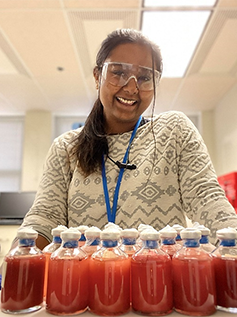 Name: Preom Sarkar
Name: Preom Sarkar
Hometown: Hatfield, Pennsylvania
Education: Bachelor’s degree in bioengineering from Lehigh University (2018) and a master’s degree in environmental engineering from Carnegie Mellon University (2019). Currently pursuing a doctorate in environmental engineering at Carnegie Mellon.
Research Project: Water Management of Power Systems Task 6.0 – Biological Treatment of FGD Effluent Streams
Flue gas desulfurization (FGD) systems mitigate air pollutants from fossil energy plants. However, such systems produce wastewater that contains other pollutants such as mercury, arsenic and selenium that must be removed before the water is released into the environment. Selenium is of interest because chronic low doses of selenium can cause detrimental ecological consequences.
Biological treatment can be used to remove selenium from FGD wastewater, but the microorganisms involved in this process and environment within FGD effluent have not been studied extensively.
Tell us something interesting about yourself.
I enjoy hiking, cooking, traveling, hanging out with my cat, watching TV, and playing video games or board games.
What is the most impactful or valuable thing that you have learned from your experience so far at NETL?
I think the most impactful part of my experience is my general transformation as a researcher. I have gained a lot of analytical experience as well as scientific writing experience that has allowed me to become a better communicator.
Please indicate and elaborate upon your experiences with the following items while at NETL.
- Access to world-class researchers and scientists: I am frequently in contact with my mentor, Djuna Gulliver. I also receive a lot feedback from the members of the geomicrobiology and geochemistry group as well as other federal research scientists. It has been beneficial to receive feedback from scientists from both inside and outside my field of study.
- Use of one-of-a-kind equipment and facilities: I love that I have been able to operate sophisticated equipment on my own. I frequently operate our Illumina MiSeq, which is a DNA sequencer, and our Agilent Bioanalyzer, which gives us information on DNA quality.
- Author/co-author papers, presentations and other publication materials: I have co-authored several papers and presentations at NETL. I helped with a Technical Report Series. I am currently working on a manuscript for my first, first authorship.
Please share some information about what ignited your early interest in science?
I am a child of immigrants from Bangladesh. Growing up, my parents emphasized education and instilled the importance of hard work and persistence in me and my younger sister.
As a child, I was mostly drawn to math and science and frequently played video games, read books and watched shows related to these topics. I really enjoyed The Magic School Bus, Zoboomafoo and Animal Planet. When the time came to apply for college, I knew I wanted to do something in the biological realm.
Did any other experiences shape your career path?
I chose bioengineering because I also wanted to help a close family friend with her autoimmune disorders and multiple sclerosis. Unfortunately, by the time I became an upperclassman at Lehigh, my friend’s condition was deteriorating rapidly, and I lost her my senior year.
I was at a loss as to what I wanted to do with my bioengineering degree. Thankfully, the summer before senior year of undergrad, I was selected for a fully funded internship in Nagoya, Japan. I went on weekly, daylong hikes around Kaisho forest to study the flora.
Being in Japan made me realize that anthropogenic climate change was rapidly approaching (and may already be here) and that I could use my bioengineering degree for many worthy purposes.
Carnegie Mellon accepted my application for their environmental engineering program. At CMU, I focused on water sustainability because water is vital for basically all life on Earth. After completing my master’s, I felt ready to find an opportunity that blended both my bioengineering and environmental engineering degrees, which led me to NETL as a research associate.
Click here for more information about NETL internships.
 Return to Spotlights & Profiles
Return to Spotlights & Profiles




 Name: Preom Sarkar
Name: Preom Sarkar